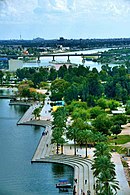Haifa Street
33°20′11.4″N 44°22′53.4″E / 33.336500°N 44.381500°E
Haifa Street (or Hayfa Street) (Arabic: شارع حيفا) is a two-mile-long street in Baghdad, Iraq, named after the port city of Haifa.[1] It runs parallel to the Tigris and, along with Yafa Street (named after the port city of Jaffa), it leads to the Assassin's Gate, an archway that served as the main entrance to the American-run Green Zone during the 2003 invasion of Iraq.[1][2] The street was given its current name by Saddam Hussein in the 1980s as part of a redevelopment program, and is lined with many high-rise buildings.[1]
Prior to the 1990–91 Gulf War, the British Embassy in Iraq was located on Haifa Street.
During the American invasion of Iraq
Haifa Street was the location of the June 2004 Operation Haifa Street,[3] and the September 2004 Haifa Street helicopter incident, in which a helicopter fired on a burning American Bradley Fighting Vehicle and killed 12 civilians, including journalist Mazen al-Tumeizi. Two days later a massive car bombing on Haifa Street killed 47.[citation needed] American troops stationed in Baghdad at the time, C Company, 1/153 IN of the Arkansas Army National Guard, part of Task Force 1/9, dubbed the street "Purple Heart Boulevard".[4] On December 24, 2004 U.S. Soldiers from B Co. 3/325th AIR of the 82d Airborne Division in taking over a palace, later dubbed Predator Palace, and made it the 3/325th A.I.R. home for 4 months. During this time the paratroopers performed combat missions to assist weeding out the enemy. Ultimately the efforts of B Co. 3/325 AIR, made Haifa Street a safer place. By mid-2005 there were reports that conditions on Haifa Street had calmed,[1][5] and control of the street was turned over to Iraqi forces in February 2006[6] but as of early 2007 the street remained riddled with insurgent hideouts. Fifty people were killed in a U.S.-led operation there on January 9, 2007[7] and another thirty were killed on January 24.[8]
Gallery
-
Haifa street, as seen from the medical city hospital across the Tigris River
-
High rising residential buildings in Haifa Street
-
King Faisal's statue at a square named after him at the end of Haifa Street
References
- ^ a b c d Burns, John F. (March 21, 2005). "There Are Signs the Tide May Be Turning on Iraq's Street of Fear". New York Times. Retrieved 2007-01-10.
- ^ "(Special Reference Graphic) NIMA 2003" (JPG). University of Texas. Retrieved 2006-06-25.
- ^ "Operation Haifa Street". Globalsecurity.org. 2006-06-15. Retrieved 2006-01-10.
- ^ Burgess, Lisa (September 22, 2004). "Patrols Turn Ugly on Baghdad's Haifa Street". Stars and Stripes European Edition. Retrieved 2006-01-10.
- ^ Peterson, Scott (May 26, 2005). "A violent street finds calm". The Christian Science Monitor. Retrieved 2007-01-10.
- ^ "Baghdad street becomes new Fallujah". The Australian. January 10, 2007. Archived from the original on January 15, 2007. Retrieved 2007-01-10.
- ^ "50 killed in US-led operation under the command of BG Bryan Roberts (then Colonel) the Commander of the Second Black Jack Brigade, First Cavalry Division in Iraq". January 10, 2007. Retrieved 2007-01-10.
- ^ Mauer, Richard (January 24, 2007). "U.S. and Iraqi troops storm Baghdad neighborhood again". McClatchy Newspapers. Retrieved 2006-01-25.





